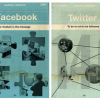The neoliberal self as personal brand first appeared in business self-help literature. In 1997, management guru Tom Peters wrote the definitive treatise on it for the business magazine Fast Company, “The Brand Called You,” which advises: “You’re not a worker…You are not defined by your job title, and you’re not confined by your job description. Starting today you are a brand.” This is essentially a recasting of Lazzarato’s immaterial labor, work that exceeds the explicit expectations of bosses. Self-branding, Peters claims, is “inescapable,” so he encourages us to ask ourselves, “What have I accomplished that I can unabashedly brag about?” and “What do I do that I am most proud of?” and then promptly put these up for sale. He admonishes that we must be eternally vigilant about our personal-brand strategy: “When you are promoting brand You, everything you do—and everything you choose not to do—communicates the value and character of the brand. Everything from the way you handle phone conversations to the email messages you send to the way you conduct business in a meeting is part of the larger message you’re sending about your brand.” This is more or less the assiduous performativity Virno labeled as “virtuosity,” which has been generalized through social media beyond the precarious workplace to social life as a whole.
Even a decade ago, the bald self-promotion one typically encounters on Twitter and Facebook would have been in questionable taste, and the idea of explicitly leveraging one’s network of friends in order to maximize one’s notoriety would have seemed preposterously alienating. Widespread ambivalence about the effects of social media on intimacy suggests that the alienation is real, as a surfeit of weak ties suffocates stronger bonds, yet stronger bonds seem available only through the online tools that have diminished them. The receptive, supportive community that recognizes you for who you are mingles uncomfortably alongside the advertisers that hope to persuade you to be something more, that are eager to hijack the self you share and make it a partner brand to help sell product. In social media, the reciprocity of friendship becomes indistinguishable from brand synergies; building trust is just another self-aggrandizing solo project in disguise. (via The New Inquiry – Social Media, Social Factory)
